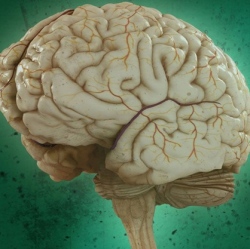
Brain tumors occur in around 250,000 people around the world every year, it is especially prevalent in underage cancer patients and treatment methods are not very effective. Researchers have just found a new 3D printing solution that will make research and medicine development far easier.
This potentially revolutionary application is still under development, with research being led by Dr Nicholas Leslie, a tumor biologist at Heriot-Watt University’s Institute of Biological Chemistry, Biophysics and Bioengineering, and by 3D printing expert Dr Will Shu. The UK-based Brain Tumour Charity has provided them with a grant of £67,000 to fund the research. The study itself is part of a much larger multi-million pound brain tumor research initiative.
But this isn’t the first time brain tumor cells have been studied in laboratory environments. Cells grown in a lab or taken from patients have been studied before, but unfortunately those cell clusters tend to behave very differently than when they’re actually part of a tumor in a patient. A cell’s behavior is primarily dictated by its environment, which makes studying the effectiveness of treatment methods very difficult. Another option is animal testing, but again the results are not fully comparable to human patients.
But that’s where 3D printing comes in. The Heriot-Watt University team will be using cutting edge 3D bioprinting hardware to recreate actual brain tumors. These will be made from patient tumors and will include stem cells from an incurable and highly aggressive form of brain cancer called glioblastoma, which is the most common tumor type found in adult brains. 3D printed tumors made from other types of cells from patients will also be realized, combined with a dense mixture of matrix proteins and other cells to mimic the brain environment of an actual person.
The goal is to secure an easily-reproducible and far more effective platform for drug treatment testing, which is still absent today. About 5,000 people in the UK alone die from malignant brain tumors, and many more are diagnosed with this form of cancer. When combined with other research initiatives backed by the Brain Tumour Charity, including studies into treatment methods for common tumors found in children, the Scottish researchers hope to better prepare medical procedures for this devastating form of cancer.
As Dr Leslie explained, their 3D bioprinting technology is now up to the challenge. “We have developed a novel 3D printing technique to print brain tumor cells for the first time, cells that continue to grow rapidly, more closely mimicking the growth of these aggressive tumors in real life,” he explained. “Our goal is that this should provide a new way of testing drugs to treat brain tumors, leading to new treatments and speeding up the process by which new drugs become available to patients. For this reason we’re happy to be funding this pioneering project at Heriot-Watt included in our major research investment introduced today.”
Dr Shu further said that the study will be a collaborative effort involving cancer biologists, engineers and clinicians. The team already has extensive 3D bioprinting experience involving stem cells. Shu added that this 3D printing solution should pave the way for experiments that were impossible to set up in the past. “The prognosis for newly diagnosed brain tumor patients is currently very poor and improvements have been very limited, in large part due to the failure in clinical trials of many new drugs,” he told The National. “We hope our research will help develop a model that closely matches… the response of individuals’ brain tumors to drugs, allowing more effective treatment to be carried out for patients.”
The Brain Tumour Charity hopes that this new 3D printing initiative could bring new impetus to a research field that has been stagnant for too long. “Progress towards more effective treatments for brain tumors has been too slow for too long,” said the charity’s chief executive Sarah Lindsell. “We urgently need new ideas to bring hope to the thousands whose lives are affected every day by this devastating disease. That’s why we are delighted to be funding this pioneering project at Heriot-Watt as part of our major research investment announced today.”
Right now, treatment methods for brain cancer are limited to surgery and chemoradiation – a mixture of chemotherapy and radiotherapy. But even this is not always effective, and the disease can progress very rapidly. This was the case for Debbie Wilkie, who was diagnosed with a glioblastoma two years ago at the age of 48. She followed all procedures, but the tumor recurred and she is now receiving palliative care. “Debbie and I were married for less than six months before she was diagnosed in 2014. Now time has run out for us. There are no more options for Debbie,” her husband Neil said. “I hope this research funded by The Brain Tumour Charity will make a real difference, so that one day a glioblastoma diagnosis is not an automatic death sentence.”
